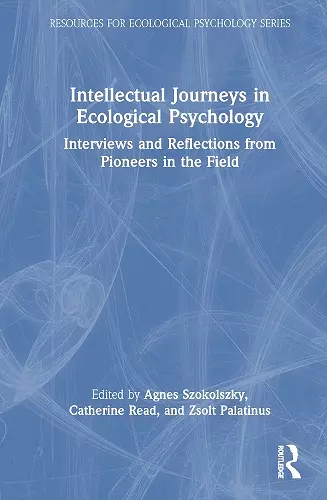Intellectual Journeys in Ecological Psychology
Interviews and Reflections from Pioneers in the Field
Catherine Read editor Agnes Szokolszky editor Zsolt Palatinus editor
Format:Hardback
Publisher:Taylor & Francis Ltd
Published:27th Dec '22
Should be back in stock very soon
This hardback is available in another edition too:
- Paperback£54.99(9780367750107)

Intellectual Journeys in Ecological Psychology: Interviews and Reflections from Pioneers in the Field presents 12 in-depth interviews with prominent scientists associated with Ecological Psychology, rooted in James Gibson’s radical approach to perception.
Featuring a mix of interviews conducted around the turn of the millennium with leading figures of Ecological Psychology, the book reveals discussions not previously found in publications and authentic personal perspectives about the early days of Ecological Psychology, a significant paradigm of post-cognitivist psychology. The interviews are supplemented by current reflections that bridge the past to the present. Each interview chapter also contains a brief biography of the interviewee and a list of their top ten most significant publications. An introductory chapter by Harry Heft provides an overview of Gibson’s theory and the post-Gibsonian theoretical landscape. A further chapter by the editors highlights lineages and patterns in the scientific careers and work of the interviewees. An epilogue by William Warren concludes the volume, addressing the current state and directions of Ecological Psychology. In the Appendix photographs taken by Sverker Runeson in the 1960s and 1970s show scenes and actors from scientific event in Ecological Psychology.
This book will be beneficial to all researchers and students in the international community of Ecological Psychology. It will also serve as a starting point for those who wish to learn more about the movement and origins of Ecological Psychology.
'This is a wonderful collection of in-depth interviews with many leading ecological psychologists, sandwiched between reflections on the past and future of the discipline. This book not only shows the excitements and struggles of the first wave of ecologists, but also reveals how the approach took shape in the two decades after the founding father James Gibson had passed away. A group of opinionated scholars with a motley collection of thrilling ideas and some serious disagreements about how to take the Gibsonian approach further. A must-read for all ecological psychologists, and of great value to historians and sociologists of science interested in the emergence of new approaches.'
Rob Withagen, Assistant Professor at the Department of Human Movement Sciences, University Medical Center Groningen, University of Groningen, the Netherlands. He is the author of Affective Gibsonian Psychology
'The researchers featured in Interviews in Ecological Psychology are among the first few generations of ecological psychologists. Subsequent generations of ecological psychologists (myself included) have benefitted from their groundbreaking contributions to the field. And now, we can also benefit from an understanding of the context in which those contributions emerged. One of the great lessons of the ecological approach is that the successful performance of everyday behavior can only be understood in the broader context of the environment in which that behavior occurs. This book is an acknowledgement that the very same thing is also true about the field of ecological psychology itself (and fields of science in general).'
Jeff Wagman, professor of Psychology at Illinois State University, United States, and an Associate Editor of the journal Ecological Psychology
'This volume will offer something for anyone wanting a deeper appreciation of the ecological approach. Agnes Szokolszky’s interviews interlace accessible accounts of the theories and methods that shaped the field with engaging stories of personal dispositions, surprise findings and chance encounters to which the field would in turn give shape. Placed in a wider context by essays from leading scholars, the resulting collection serves not only as an important historical document but also as a powerful reminder of the pluralism of views that makes a science.'
Ludger van Dijk, philosopher based at the group for Systemic Change at the Eindhoven University of Technology and at the Centre for Philosophical Psychology at the University of Antwerp, in Belgium
'Reading these interviews has been humbling. You know you are in the presence of some of the greatest theoreticians of Psychology. The sources of their theoretical commitments and the paths their thinking has traveled through are fascinating. More importantly, they are significant for understanding the shape of psychology as a discipline. The book may engender feelings of regret – thinking of the many missed chances in the psychological sciences. However, these powerful interviews give me hope: maybe they will stir the theoretical consciences of the new generation of thinkers in Psychology. Maybe they will serve to halt blinkered empiricism and bring philosophical depth into every piece of research we do.'
Vasudevi Reddy, Emeritus Professor of Development and Cultural Psychology at the University of Portsmouth. She is the author of How Infants Know Minds, winner of the British Psychological Society's Best Book Award, 2011
ISBN: 9780367750121
Dimensions: unknown
Weight: 453g
446 pages